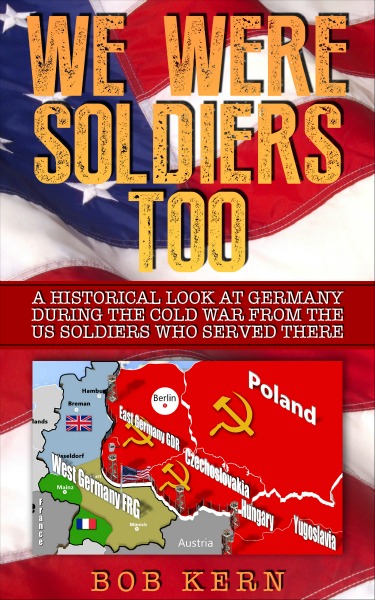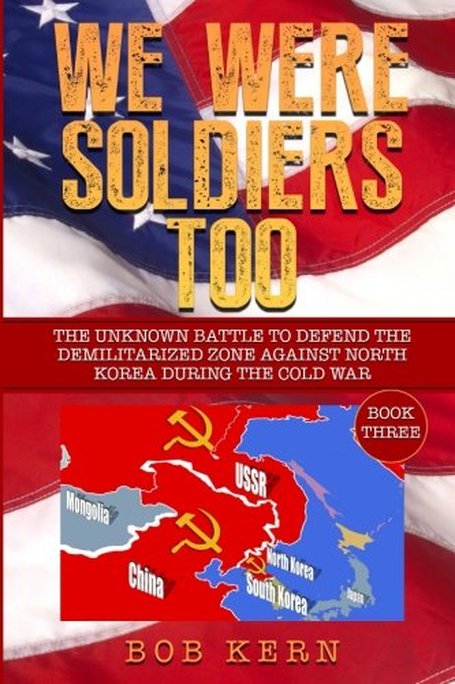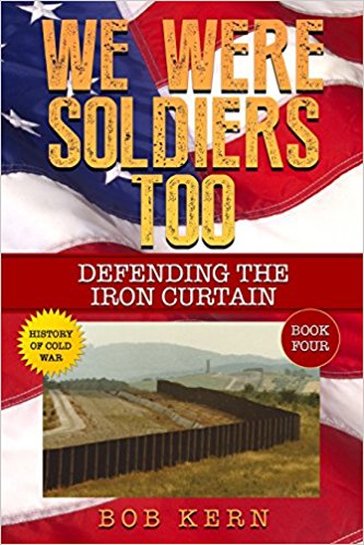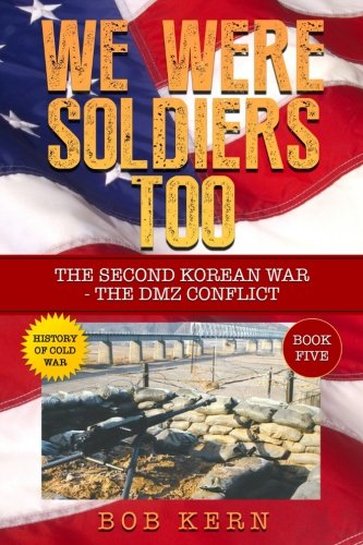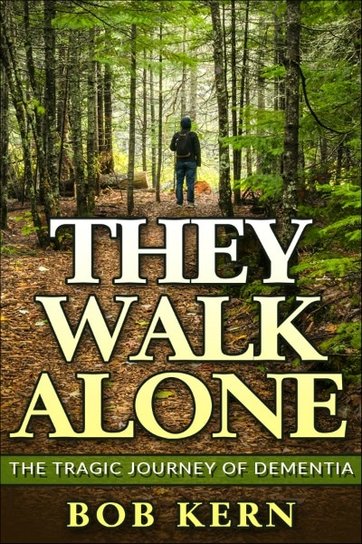Bob Kern
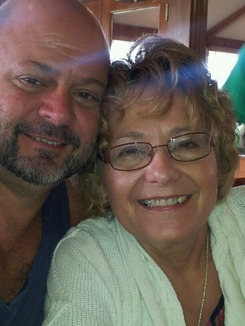
Bob Kern is a native Hoosier. Born and raised in Indiana, like many boys in the 70’s, he admired those who served in the military. At the age of seventeen, he enlisted in the US Army never dreaming that he would find himself thrust into the middle of the Cold War he had been learning about in history class just months before.
Bob was in the US Army for almost 8 years and during those years he was quickly educated about the military life that civilians never see or hear about. Since his honorable discharge in 1988, he has repeatedly thought about sharing his story with others to shed light on a time in history that hasn't gained as much attention despite the importance of the time period to US peace.
The horrific events of 9/11 had a profound effect on Bob when other people began thanking him for his service. Suddenly, feelings of guilt overwhelmed him for not actually seeing combat. Knowing there was nothing to be ashamed of, Bob realized many Cold War veterans probably had similar feelings. Being a peacetime soldier in a wartime era has this effect.
Bob decided to write and publish the story of his military career so that others may have an inside view of what it was like to be in the military at that time. Due to the overwhelming support and response from other Cold War veterans, the sequel to We Were Soldiers Too is currently being written and will tell other veterans stories.
Bob is the father of five children - Natalie, Bambie, Amber, Bob, and Rob. He resides in Bedford, Indiana with his wife Marsha and his three granddaughters; Sage, Jade, and Harmonie.
Bob enjoys connecting with US veterans and sharing their stories with others.
Bob was in the US Army for almost 8 years and during those years he was quickly educated about the military life that civilians never see or hear about. Since his honorable discharge in 1988, he has repeatedly thought about sharing his story with others to shed light on a time in history that hasn't gained as much attention despite the importance of the time period to US peace.
The horrific events of 9/11 had a profound effect on Bob when other people began thanking him for his service. Suddenly, feelings of guilt overwhelmed him for not actually seeing combat. Knowing there was nothing to be ashamed of, Bob realized many Cold War veterans probably had similar feelings. Being a peacetime soldier in a wartime era has this effect.
Bob decided to write and publish the story of his military career so that others may have an inside view of what it was like to be in the military at that time. Due to the overwhelming support and response from other Cold War veterans, the sequel to We Were Soldiers Too is currently being written and will tell other veterans stories.
Bob is the father of five children - Natalie, Bambie, Amber, Bob, and Rob. He resides in Bedford, Indiana with his wife Marsha and his three granddaughters; Sage, Jade, and Harmonie.
Bob enjoys connecting with US veterans and sharing their stories with others.
We Were Soldiers Too: Serving as a Reagan Soldier During the Cold War
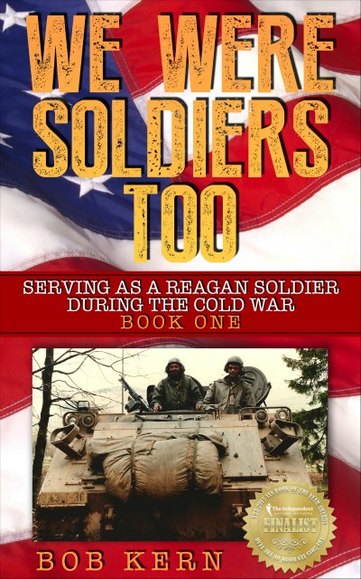
Military History
Finalist for Book of the Year Military Autobiography in 2015
A GRIPPING, TRUE STORY TOLD FROM THE FRONT LINES AS THE WORLD FACED THE POSSIBILITY OF NUCLEAR WAR
This is a personal account of military service and the historical events that were happening during President Reagan's time in office as the world faced the possibility of nuclear war. The author was in the US Army from November 1980 until March 1988 which coincided with President Reagan's time in office. He quickly went from a naive seventeen-year-old boy to a dedicated die hard soldier ready to sacrifice his life for his country.
˃˃˃ An assignment that likely would have been at Ground Zero of a nuclear war.
On the verge of World War 3 and nuclear war, "We Were Soldiers Too" is about the difficult job of serving in the infantry during a very critical time of the Cold War.
Serving as the first line of defense for a Soviet invasion in Germany, he found himself assigned the responsibility of defending an area in the Fulda Gap with only one objective, to hold the advancing Soviets until reinforcements arrived.
˃˃˃ Read what other veterans think of "We Were Soldiers Too"
"An excellent illustration of the lives and sacrifices of our Cold War enlisted service members. I recommend it to all. It brings back memories of those days and what we did during that era." Edward A. Chesky
"I highly recommend this for anyone to read, especially for anyone that has served this great Nation. I suspect that my fellow Cold War Veterans will be able to relate to a lot of what this author writes about." Tracy A Stephens
"An excellent book about those men who served during the Cold War. Excellent insight into how the Army prepared for a possible Soviet invasion. I highly recommend this book." Gary E. Earls
"I too am a Cold War Reagan Soldier and I Enjoyed this Book very much. I think Bob did a great job by putting in writing how we all feel. We were highly Trained and Ready to meet any Challenge and Subdue any Threat. We were part of the Strongest Army in the history of the United States. We were and Still Are Soldiers. I am Proud to have served with such fine members of the Military." Curtis Nazelrod
Grab a copy today!
We Were Soldiers Too Sample Chapter
Finalist for Book of the Year Military Autobiography in 2015
A GRIPPING, TRUE STORY TOLD FROM THE FRONT LINES AS THE WORLD FACED THE POSSIBILITY OF NUCLEAR WAR
This is a personal account of military service and the historical events that were happening during President Reagan's time in office as the world faced the possibility of nuclear war. The author was in the US Army from November 1980 until March 1988 which coincided with President Reagan's time in office. He quickly went from a naive seventeen-year-old boy to a dedicated die hard soldier ready to sacrifice his life for his country.
˃˃˃ An assignment that likely would have been at Ground Zero of a nuclear war.
On the verge of World War 3 and nuclear war, "We Were Soldiers Too" is about the difficult job of serving in the infantry during a very critical time of the Cold War.
Serving as the first line of defense for a Soviet invasion in Germany, he found himself assigned the responsibility of defending an area in the Fulda Gap with only one objective, to hold the advancing Soviets until reinforcements arrived.
˃˃˃ Read what other veterans think of "We Were Soldiers Too"
"An excellent illustration of the lives and sacrifices of our Cold War enlisted service members. I recommend it to all. It brings back memories of those days and what we did during that era." Edward A. Chesky
"I highly recommend this for anyone to read, especially for anyone that has served this great Nation. I suspect that my fellow Cold War Veterans will be able to relate to a lot of what this author writes about." Tracy A Stephens
"An excellent book about those men who served during the Cold War. Excellent insight into how the Army prepared for a possible Soviet invasion. I highly recommend this book." Gary E. Earls
"I too am a Cold War Reagan Soldier and I Enjoyed this Book very much. I think Bob did a great job by putting in writing how we all feel. We were highly Trained and Ready to meet any Challenge and Subdue any Threat. We were part of the Strongest Army in the history of the United States. We were and Still Are Soldiers. I am Proud to have served with such fine members of the Military." Curtis Nazelrod
Grab a copy today!
We Were Soldiers Too Sample Chapter
We Were Soldiers Too: A Historical Look at Germany During the Cold War From the US Soldiers Who Served There
|
Military History
Finalist for eBook of the Year General Nonfiction and Finalist for Book of the Year Nonfiction Military History in 2016 and currently a Finalist in Nonfiction History with the Independent Authors Network. #1 Amazon Best Seller Cold War History for 5 WeeksGround zero for a nuclear war was just over an hour northeast of Frankfurt, Germany. The small town of Fulda is nestled at the base of a natural gap in the hilly wooded terrain of West Germany and was a corridor between East and West Germany. Referred to as the Fulda Gap, this corridor was very likely the path the Warsaw forces and the Soviet Union would have taken to invade Europe. ˃˃˃ The following is a historical look at the Cold War in Germany through the careers of seventeen veterans who served there. These are their stories as they prepared to defend the Fulda Gap and ground zero” The brave men and women who served in West Germany were the first line of defense against the enemy horde that would come through the gap if hostilities ever began. Their mission was to hold that advancing horde for forty-eight hours until reinforcements arrived. None of them were expected to survive an invasion and they all knew it. This was what they had enlisted for, it was their job, and they did it proudly. Grab a copy today! |
We Were Soldiers Too: The Unknown Battle to Defend the Demilitarized Zone Against North Korea During the Cold War (Volume 3)
|
Military History
The Demilitarized Zone (DMZ) separates North and South Korea and is the most defended border in the world.Both sides have dug their heels in and fortified the DMZ with defensive positions, mines and booby traps, missiles, and soldiers as they remain vigilant for the recommencement of a war that never ended. Unlike most wars that end with an official treaty, the Korean War had reached an impasse in 1953 and both sides signed an Armistice Agreement which was nothing more than a truce that remains in effect to this day. Since the signing of the Armistice Agreement, the United Nations has attempted to enforce this treaty that the North Koreans violated almost daily sending spies, marauders, hit squads, and ambush patrols into the southern controlled portion of the DMZ in their never-ending effort to destabilize South Korea and cause its collapse. Their blatant violations of the Armistice Agreement has left a bloody trail of dead bodies that includes many American soldiers. This book takes the reader on a journey through the history of the Cold War and the defense of the DMZ from the perspective of nine American veterans, and eleven tours, who served in different capacities in South Korea from 1962 through 1991. |
We Were Soldiers Too: Defending the Iron Curtain (Volume 4)
|
Military History
“From Stettin in the Baltic to Trieste in the Adriatic, an iron curtain has descended across the continent.” Winston Churchill- March 5, 1946. The “Iron Curtain” he referenced shortly after World War II was the border in Europe that separated the west from the east. It separated freedom from communism and NATO from the Warsaw Pact. A border that quickly became fortified with a fence and a wall. The “Iron Curtain” would come to symbolize a divided world for the duration of the Cold War. West Germany would become the focal point where NATO would prepare for an invasion by the Soviet Union. The Fulda Gap became the likely route the communist horde would take to conquer Europe. This area was referred to as ground zero for World War III. The United States military was tasked with stopping the Soviet attack until reinforcements arrived. A mission with zero chance of survival. Yet, millions of young soldiers met this challenge over the decades of the Cold War. Vigilant and ready to give their lives when the call came. No mission was more important than that of the brave soldiers who served on the border. They were tasked with guarding the border and observing the communist activity around the clock. These valiant soldiers patrolled by foot and jeep a few feet from the Iron Curtain and in full view of their communist counterparts. They regarded themselves as the tripwire responsible for alerting the supporting forces of an invasion. A mere speed bump for any invasion. This book provides insight into the Cold War from the unique perspective of the veterans who served on this border. |
We Were Soldiers Too: The Second Korean War - The DMZ Conflict
|
Military History
Snipers in the guard towers would fire at them. North Korean patrols would shoot at them from across the MDL. The North Koreans would even cross the MDL to assault a patrol. They then hightailed it back across to avoid return fire. The rules of engagement allowed Dennis to return fire inside the DMZ. He had to cease fire once they crossed back over the MDL. There were provisions that did allow engaging combatants across the border. All that was needed was permission from higher up. By the time it took to get permission, it was too late. The North Koreans knew the firing rules that patrols had to follow. They would use them against our forces every opportunity they could. Therein lies the dilemma in North Korea. US and ROK soldiers had to follow strict rules against an enemy that ignored the rules. A patrol comes under fire and takes casualties. Several dead and several wounded friends. The cowardly North Koreans that did this simply put their tail between their legs and ran back across the border. It was over. No retaliation. No pursuit. The Armistice Agreement says neither side could cross the MDL. They did it anyway. All the time. With no consequences. Sure, the UNC would call a MAC meeting. Both sides would travel to the JSA and gather at the “peace” table. Complaints would be made and the North Koreans would deny it. Four to five times a month these meetings were called. North Korea would be accused and they would deny it. It was like a never-ending movie from hell. The storyline changed every day but the ending was always the same. This is exactly why the North Koreans continue to do what they want sixty plus years later. They’re never held accountable. |
How To Waste Money Self Publishing
|
Publishing
The perfect book for new authors unfamiliar with the self-publishing process and the pitfalls of marketing your first eBook. This book covers all the essentials for publishing without all the nonsense. It is filled with a number of examples of the many money traps out there offering secret formulas for success and other horse hockey designed to coerce new authors out of their hard earned money. |
They Walk Alone - The Tragic Journey of Dementia
|
Non-Fiction, Alzheimer's Disease
It is pure torture to watch a loved one slowly lose everything and know there is nothing that can be done for them It is so important to reassure your loved ones during the early stages of this disease. The more worked up they get, the more inept and useless they feel. Nobody should feel this way, especially those in the early stages of dementia. It’s not easy to be patient under normal circumstances. It’s even harder the fifteenth time you’re looking for a cell phone or car keys. You must force yourself to always exercise patience. If finding their phone is important to them, then it should be important to you. Telling them not to worry about it, or it’ll show up, doesn’t help at all. You might as well be talking to a wall. Finding a lost item will become a fixation for them. Drop whatever you’re doing and find the item. Be sure to include them in your search. Chances are they’re going to follow you around anyway. This is a memoir of my journey caring for two loved ones, and experiencing the loss of a third loved one to this terrible disease. Witness with me, up-close and personal, the different stages of dementia- from early signs, diagnoses, progression, and finally the heart wrenching end. Learn from my experiences to identify the early symptoms sooner. And, more importantly, learn how to care for your loved one so that they never walk alone… |








